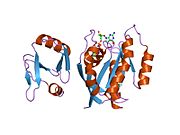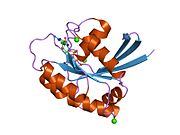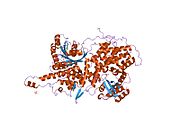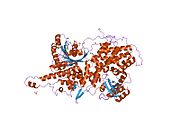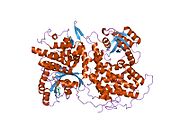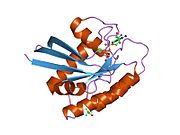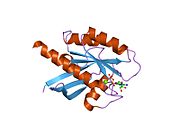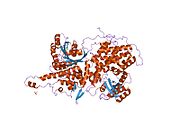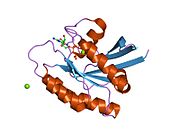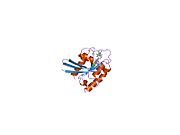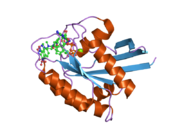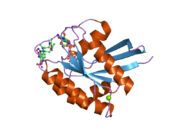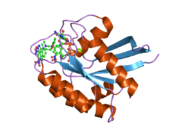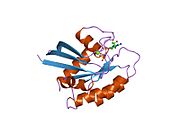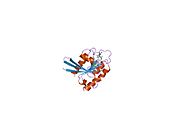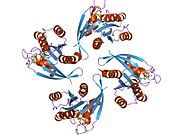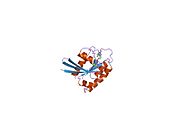KRAS
KRASKRAS는 RAS/MAPK 경로의 일부인 K-Ras라고 불리는 단백질을 만드는 명령을 제공하는 유전자이다.단백질은 세포 외부에서 세포핵으로 신호를 전달합니다.이러한 신호는 세포가 성장 및 분열(증식)하거나 성숙하여 특수 기능을 수행(분화)하도록 지시합니다.그것은 Kirsten RAt Sarcoma [5]바이러스에서 바이러스 종양 유전자로 처음 확인되었기 때문에 KRAS라고 불린다.확인된 종양 유전자는 세포 게놈에서 유래한 것이므로, 세포 게놈에서 발견되었을 때 KRAS는 원종 유전자라고 불립니다.
K-Ras 단백질은 뉴클레오티드 구아노신 삼인산(GTP)을 구아노신 이인산(GDP)으로 변환하는 효소인 GTPase이다.이런 식으로 K-Ras 단백질은 GTP와 GDP 분자에 의해 켜지고 꺼지는 스위치와 같은 역할을 한다.신호를 전송하려면 GTP 분자에 부착(결합)하여 켜야 합니다.K-Ras 단백질은 GTP를 GDP로 전환할 때 꺼지고(비활성화), 단백질이 GDP와 결합할 때 세포핵에 신호를 전달하지 않는다.
KRAS의 유전자 생성물인 K-Ras 단백질은 p21 [6][7]GTPase로 처음 발견되었다.GTPases의 Ras 하위 패밀리의 다른 멤버들과 마찬가지로, K-Ras 단백질은 많은 신호 전달 경로에서 초기 플레이어이다.K-Ras는 C 말단에 이소프렌기가 존재하기 때문에 보통 세포막에 묶여 있다.대체 엑손4(exon4A, 4B)의 사용으로 인한 포유동물 세포 내 KRAS 유전자의 단백질 생성물은 K-Ras4A, K-Ras4B 두 가지가 있다.이러한 단백질은 C 말단 영역에 다른 구조를 가지고 있으며 혈장막을 [8]포함한 세포막에 국재하기 위해 다른 메커니즘을 사용합니다.
기능.
KRAS는 단백질 역학을 사용하여 분자 온/오프 스위치 역할을 합니다.알로스테릭하게 활성화되면 성장인자의 증식에 필요한 단백질과 c-Rap, PI 3-kinase와 같은 다른 세포 시그널링 수용체를 모집하여 활성화한다.KRAS는 GLUT1 포도당 운반체를 상향 조절하여 암세포에서 [9]워버그 효과에 기여한다.KRAS는 액티브 상태에서 GTP에 바인드합니다.또한 뉴클레오티드의 말단 인산염을 분해하여 GDP로 변환하는 내인성 효소 활성을 가지고 있으며, GTP를 GDP로 변환하면 KRAS가 비활성화된다.전환 속도는 보통 느리지만 GTPase-Activating Protein(GAP; GTPase 활성화 단백질) 클래스의 보조 단백질(예:[citation needed] RasGAP)에 의해 극적으로 증가할 수 있습니다.차례로, KRAS는 결합 뉴클레오티드(GDP)의 방출을 강제하는 구아닌 뉴클레오티드 교환인자(GEF) 클래스의 단백질에 결합할 수 있다.이어서 KRAS는 세포에 존재하는 GTP를 결합하고 GEF는 ras-GTP에서 방출된다.
Ras 패밀리의 다른 멤버는 HRAS와 NRAS입니다.이 단백질들은 모두 같은 방식으로 조절되고 [citation needed]세포 내에서 작용 부위가 다른 것으로 보입니다.
돌연변이 시 임상적 중요성
이 원형은 포유동물인 Ras 유전자 계열의 Kirsten Ras 종양 유전자 상동체입니다.단일 아미노산 치환, 특히 단일 뉴클레오티드 치환은 활성화 돌연변이를 일으킨다.그 결과 생기는 변형 단백질은 폐선암,[10] 점액선종, 췌장관암, 대장암 [11][12]등 다양한 악성 종양과 관련이 있다.
몇몇 생식선 KRAS 돌연변이는 누난[13] 증후군과 심장-시설-피부 [14]증후군과 관련이 있는 것으로 밝혀졌다.
체세포 KRAS 돌연변이는 백혈병, 대장암,[15] 췌장암[16],[17] 폐암에서 높은 비율로 발견된다.
대장암
KRAS 돌연변이의 영향은 돌연변이의 순서에 따라 크게 좌우된다.1차 KRAS 돌연변이는 일반적으로 자가 제한성 과형성 또는 경계선 병변으로 이어지지만, 이전 APC 돌연변이 후에 발생하면 [18]암으로 진행되는 경우가 많다.KRAS 돌연변이는 대장암보다 대장암에서 [19][20]더 흔하게 관찰된다.
KRAS 돌연변이는 대장암에서 [21]패니투맵(벡티빅스)과 세턱시맵(ERbitux) 치료에 대한 매우 낮은 반응을 예측한다.
현재 대장암 환자가 EGFR 억제 약물 중 하나에 반응할지를 예측하는 가장 신뢰할 수 있는 방법은 대장암의 30%~50%에서 발생하는 KRAS를 코드하는 유전자의 특정 "활성화" 돌연변이를 검사하는 것이다.연구에 따르면 KRAS 유전자의 돌연변이 버전을 발현하는 종양이 있는 환자들은 세턱시맙이나 [22]파니투맵에 반응하지 않는다.
야생형(또는 정상적인) KRAS 유전자의 존재가 이러한 약물이 효과가 있다는 것을 보장하지는 않지만, 많은 대규모[23][24] 연구들이 KRAS 야생형 종양을 가진 mCRC 환자들에게서 cetuximab이 유의미한 효능을 가지고 있다는 것을 보여주었다.2009년에 발표된 Phase III CRISTL 연구에서 Erbitux + 화학요법으로 처리된 야생형 KRAS 유전자 환자는 화학요법으로만 처리된 환자보다 최대 59%의 응답률을 보였다.또한 KRAS 야생형 유전자를 가진 환자들은 화학요법만 [24]받는 환자들에 비해 질병 진행 위험이 32% 감소하였다.
KRAS 돌연변이의 출현은 대장암에서 cetuximab 항EGFR 치료에 대한 후천적 저항성의 빈번한 요인이다.KRAS 돌연변이 클론의 출현은 방사선 촬영 진행 수개월 전에 비침습적으로[how?] 검출될 수 있다.약물 내성을 [25]늦추거나 되돌리기 위한 합리적인 전략으로 MEK 억제제의 조기 개시를 수행할 것을 제안한다.
KRAS 증폭
KRAS 유전자는 대장암에서도 증폭될 수 있다.이 유전적 병변을 가진 종양이나 세포주는 EGFR 억제제에 반응하지 않는다.KRAS 증폭은 대장암에서 드물게 발생하지만 일부 환자의 [26]항EGFR 치료에 대한 반응을 차단하는 역할을 할 수 있다.야생형 [27]Kras의 증폭은 난소암,[28] 위암, 자궁암, 폐암에서도 관찰되었다.
폐암
환자가 표피 성장인자 수용체(EGFR)의 돌연변이에 대해 양성인지 음성인지 여부는 환자가 에를로티니브(Tarceva) 또는 게피티니브(Iressa)와 같은 특정 EGFR 길항제들에 어떻게 반응할 것인지를 예측할 것이다.EGFR 돌연변이를 가진 환자는 erlotinib에 60%의 응답률을 보입니다.그러나 KRAS와 EGFR의 돌연변이는 일반적으로 상호 [29][30][31]배타적이다.KRAS 돌연변이에 양성 반응을 보이는 폐암 환자(및 EGFR 상태는 야생형일 수 있음)는 에를로티닙 또는 게피티닙에 대한 반응률이 5% [29]이하로 낮다.
돌연변이 상태와 유전자 발현을 포함한 다양한 유형의 데이터는 유의한 예측 [32]능력을 가지고 있지 않았다.비소세포 폐암(NSCLC)[32]에서 KRAS 염기서열 분석을 수행한 모든 연구의 72%에서 생존에 대한 상관관계가 관찰되지 않았다.그러나 KRAS 돌연변이는 유전자 자체와 대응하는 단백질의 발현에 영향을 미칠 수 있을 뿐만 아니라 세포 성장, 분화 및 세포자멸을 조절하는 중요한 경로에 관여하는 다른 하류 유전자의 발현에도 영향을 미칠 수 있다.KRAS 돌연변이 종양에서 이러한 유전자의 다른 발현은 환자의 임상 [32]결과에 더 큰 영향을 미칠 수 있다.
2008년의 종이 암 연구에서 발간하는 화합물oncrasin-1"시퀀스에 의해;70%, 탐지할 수 있는 독성을 야기하지 않고 누드 쥐 이 종양들은 베어링의 생존이 늘어나K-ras 돌연변이 인간 폐 종양 xenografts의 성장 억제"의 exvivo정부는,고,"결과는 또는oncrasin-1의 능동적인 것을 보여 준다 결론을 내렸다. 어록로그는 K-Ras 돌연변이 [33]암세포를 효과적으로 죽이는 새로운 종류의 항암제가 될 수 있습니다."
KRAS 테스트
2009년 7월, 미국 식품의약국(FDA)은 전이성 대장암 치료를 위해 표시된 두 가지 항EGFR 모노클로널 항체 약물인 파니투맙(벡티빅스)과 세턱시맙(에르비턱스)의 라벨을 업데이트하여 KRAS 돌연변이에 [34]대한 정보를 포함시켰다.
FDA는 2012년 대장암세포에서 KRAS 유전자의 7가지 돌연변이를 검출하기 위한 유전자 검사인 QIAGEN의 테라스스크린 KRAS 검사도 승인했다.이 검사는 의사가 Erbitux로 치료하기 위해 전이성 대장암 환자를 식별하는 데 도움이 됩니다.대장암 조직에 KRAS 돌연변이가 있다는 것은 환자가 Erbitux를 통한 치료를 받지 못할 수 있음을 나타냅니다.검사 결과 대장암세포에 KRAS 돌연변이가 없는 것으로 나타났을 경우 Erbitux [35]치료를 고려할 수 있습니다.
약물 표적으로서
KRAS의 운전자 돌연변이는 인간 [36]암의 최대 20%의 병인 발생의 기초가 된다.따라서 KRAS는 매력적인 약물 대상이지만 명확한 결합 부위의 부족이 의약품 개발을 [37]방해하고 있다.잠재적인 약물 상호작용 사이트 중 하나는 GTP/GDP가 결합하는 곳이다.그러나 이 사이트에 대한 GTP/GDP의 친화력이 매우 높기 때문에 약물 유사 소분자 억제제가 GTP/GDP 결합과 경쟁할 가능성은 낮다.GTP/GDP가 결합하는 곳 이외에는 작은 [38]분자에 대한 명확한 높은 친화력 결합 부위가 없다.
G12C 돌연변이
상당히 빈번한 드라이버 돌연변이는 얕은 결합 부위에 인접한 KRAS입니다G12C.이를 통해 Cys-12의 친핵성 황 원자와 불가역적 공유 결합을 형성할 수 있는 친전자성 KRAS 억제제를 개발하여 선택적으로 KRAS를 표적화하고G12C 야생형 KRAS를 그대로 [41]둘 수 있게 되었다.
KRASG12C 돌연변이 공유억제제 중 하나인 소토라시브(AMG 510, Amgen)는 2021년 미국 FDA에 의해 비소세포 폐암(NSCLC) 치료제로 승인되어 시장에 출시되어 임상 [42][43]사용에 들어간 최초의 KRAS 억제제가 되었다.두 번째 아다그라시브(MRTX-849, Mirati Therapeutics)[44][45]와 JNJ-74699157(ARS-3248, Wellspring Biosciences/Jansen이라고도 함)[46]은 임상시험을 시작하기 위한 조사 신약(IND) 승인을 받았다.KRAS를 대상으로 하는 안티센스 올리고뉴클레오티드(ASO)인 AZD4785(AstraZeneca/Ionis Therapeutics)는 I상[47] 연구를 완료하였으나 대상 [48]녹다운이 불충분하여 추가 개발에서 중단되었다.
G12D 돌연변이
가장 흔한 KRAS 돌연변이는 G12D로 최대 37%의 췌장암과 12% 이상의 대장암에 존재하는 것으로 추정된다.일반적으로 KRAS 단백질의 아미노산 위치 12는 글리신이 차지하지만 G12D에서는 아스파라긴산이 차지합니다.
현재 개발 임상 단계에 진입한 KRAD G12D 돌연변이를 대상으로 하는 시판 약물 후보는 없다.KRAS G12D를 대상으로 한 새로운 유전자 치료법의 첫 임상시험은 현재 환자를 모집하고 있으며 국립암연구소가 [49]후원하고 있다.
KRAD G12D 돌연변이를 대상으로 하는 임상 전 단계의 약물 후보가 다수 존재한다.Mirati 치료제는 과거 임상시험을 [50]시작하기 위해 H1:2021에 조사용 신약(IND) 승인을 구하고 있다고 밝힌 바 있다.레볼루션 의약품은 현재 소분자 치료법을 연구 중이며 KRAS-G12D 돌연변이 종양 모델에서 항종양 활성을 보고했습니다.VRise Therapeutics는 새로운 KRAS G12D 억제제의 임상 전 개발 진척을 보고했다.
상호 작용
KRAS는 다음과 상호작용하는 것으로 나타났습니다.
레퍼런스
- ^ a b c GRCh38: 앙상블 릴리즈 89: ENSG00000133703 - 앙상블, 2017년 5월
- ^ a b c GRCm38: 앙상블 릴리즈 89: ENSMUSG000030265 - 앙상블, 2017년 5월
- ^ "Human PubMed Reference:". National Center for Biotechnology Information, U.S. National Library of Medicine.
- ^ "Mouse PubMed Reference:". National Center for Biotechnology Information, U.S. National Library of Medicine.
- ^ Tsuchida N, Ryder T, Ohtsubo E (1982). "Nucleotide sequence of the oncogene encoding p21 transforming protein of Kirsten murine sarcoma virus". Science. 217 (4563): 937–939. Bibcode:1982Sci...217..937T. doi:10.1126/science.6287573. PMID 6287573.
- ^ Scolnick EM, Papageoege AG, Shih TY (1979). "Guanine nucleotide-binding activity for src protein of rat-derived murine sarcoma viruses". Proc Natl Acad Sci USA. 76 (5): 5355–5559. doi:10.1073/pnas.76.10.5355. PMC 413141. PMID 228228.
- ^ Kranenburg O (November 2005). "The KRAS oncogene: past, present, and future". Biochimica et Biophysica Acta (BBA) - Reviews on Cancer. 1756 (2): 81–2. doi:10.1016/j.bbcan.2005.10.001. PMID 16269215.
- ^ Welman A, Burger MM, Hagmann J (September 2000). "Structure and function of the C-terminal hypervariable region of K-Ras4B in plasma membrane targeting and transformation". Oncogene. 19 (40): 4582–91. doi:10.1038/sj.onc.1203818. PMID 11030147.
- ^ Yun J, Rago C, Cheong I, Pagliarini R, Angenendt P, Rajagopalan H, Schmidt K, Willson JK, Markowitz S, Zhou S, Diaz LA, Velculescu VE, Lengauer C, Kinzler KW, Vogelstein B, Papadopoulos N (September 2009). "Glucose deprivation contributes to the development of KRAS pathway mutations in tumor cells". Science. 325 (5947): 1555–9. Bibcode:2009Sci...325.1555Y. doi:10.1126/science.1174229. PMC 2820374. PMID 19661383.
- ^ Chiosea SI, Sherer CK, Jelic T, Dacic S (December 2011). "KRAS mutant allele-specific imbalance in lung adenocarcinoma". Modern Pathology. 24 (12): 1571–7. doi:10.1038/modpathol.2011.109. PMID 21743433.
- ^ Hartman DJ, Davison JM, Foxwell TJ, Nikiforova MN, Chiosea SI (October 2012). "Mutant allele-specific imbalance modulates prognostic impact of KRAS mutations in colorectal adenocarcinoma and is associated with worse overall survival". International Journal of Cancer. 131 (8): 1810–7. doi:10.1002/ijc.27461. PMID 22290300. S2CID 27328214.
- ^ Krasinskas AM, Moser AJ, Saka B, Adsay NV, Chiosea SI (October 2013). "KRAS mutant allele-specific imbalance is associated with worse prognosis in pancreatic cancer and progression to undifferentiated carcinoma of the pancreas". Modern Pathology. 26 (10): 1346–54. doi:10.1038/modpathol.2013.71. PMC 4128625. PMID 23599154.
- ^ Schubbert S, Zenker M, Rowe SL, Böll S, Klein C, Bollag G, van der Burgt I, Musante L, Kalscheuer V, Wehner LE, Nguyen H, West B, Zhang KY, Sistermans E, Rauch A, Niemeyer CM, Shannon K, Kratz CP (March 2006). "Germline KRAS mutations cause Noonan syndrome". Nature Genetics. 38 (3): 331–6. doi:10.1038/ng1748. PMID 16474405. S2CID 8193354.
- ^ Niihori T, Aoki Y, Narumi Y, Neri G, Cavé H, Verloes A, Okamoto N, Hennekam RC, Gillessen-Kaesbach G, Wieczorek D, Kavamura MI, Kurosawa K, Ohashi H, Wilson L, Heron D, Bonneau D, Corona G, Kaname T, Naritomi K, Baumann C, Matsumoto N, Kato K, Kure S, Matsubara Y (March 2006). "Germline KRAS and BRAF mutations in cardio-facio-cutaneous syndrome". Nature Genetics. 38 (3): 294–6. doi:10.1038/ng1749. PMID 16474404. S2CID 28915489.
- ^ Burmer GC, Loeb LA (April 1989). "Mutations in the KRAS2 oncogene during progressive stages of human colon carcinoma". Proceedings of the National Academy of Sciences of the United States of America. 86 (7): 2403–7. Bibcode:1989PNAS...86.2403B. doi:10.1073/pnas.86.7.2403. PMC 286921. PMID 2648401.
- ^ Almoguera C, Shibata D, Forrester K, Martin J, Arnheim N, Perucho M (May 1988). "Most human carcinomas of the exocrine pancreas contain mutant c-K-ras genes". Cell. 53 (4): 549–54. doi:10.1016/0092-8674(88)90571-5. PMID 2453289. S2CID 22457575.
- ^ Tam IY, Chung LP, Suen WS, Wang E, Wong MC, Ho KK, Lam WK, Chiu SW, Girard L, Minna JD, Gazdar AF, Wong MP (March 2006). "Distinct epidermal growth factor receptor and KRAS mutation patterns in non-small cell lung cancer patients with different tobacco exposure and clinicopathologic features". Clinical Cancer Research. 12 (5): 1647–53. doi:10.1158/1078-0432.CCR-05-1981. PMID 16533793.
- ^ Vogelstein B, Kinzler KW (August 2004). "Cancer genes and the pathways they control". Nature Medicine. 10 (8): 789–99. doi:10.1038/nm1087. PMID 15286780. S2CID 205383514.
- ^ Yamauchi M, Morikawa T, Kuchiba A, Imamura Y, Qian ZR, Nishihara R, Liao X, Waldron L, Hoshida Y, Huttenhower C, Chan AT, Giovannucci E, Fuchs C, Ogino S (June 2012). "Assessment of colorectal cancer molecular features along bowel subsites challenges the conception of distinct dichotomy of proximal versus distal colorectum". Gut. 61 (6): 847–54. doi:10.1136/gutjnl-2011-300865. PMC 3345105. PMID 22427238.
- ^ Rosty C, Young JP, Walsh MD, Clendenning M, Walters RJ, Pearson S, Pavluk E, Nagler B, Pakenas D, Jass JR, Jenkins MA, Win AK, Southey MC, Parry S, Hopper JL, Giles GG, Williamson E, English DR, Buchanan DD (June 2013). "Colorectal carcinomas with KRAS mutation are associated with distinctive morphological and molecular features". Modern Pathology. 26 (6): 825–34. doi:10.1038/modpathol.2012.240. PMID 23348904.
- ^ Lièvre A, Bachet JB, Le Corre D, Boige V, Landi B, Emile JF, Côté JF, Tomasic G, Penna C, Ducreux M, Rougier P, Penault-Llorca F, Laurent-Puig P (April 2006). "KRAS mutation status is predictive of response to cetuximab therapy in colorectal cancer". Cancer Research. 66 (8): 3992–5. doi:10.1158/0008-5472.CAN-06-0191. PMID 16618717.
- ^ van Epps HL (Winter 2008). "Bittersweet Gene". CURE (Cancer Updates, Research and Education). Archived from the original on 2009-02-07.
- ^ Bokemeyer C, Bondarenko I, Makhson A, Hartmann JT, Aparicio J, de Braud F, Donea S, Ludwig H, Schuch G, Stroh C, Loos AH, Zubel A, Koralewski P (February 2009). "Fluorouracil, leucovorin, and oxaliplatin with and without cetuximab in the first-line treatment of metastatic colorectal cancer" (PDF). Journal of Clinical Oncology. 27 (5): 663–71. doi:10.1200/JCO.2008.20.8397. hdl:2434/652169. PMID 19114683.
- ^ a b Van Cutsem E, Köhne CH, Hitre E, Zaluski J, Chang Chien CR, Makhson A, D'Haens G, Pintér T, Lim R, Bodoky G, Roh JK, Folprecht G, Ruff P, Stroh C, Tejpar S, Schlichting M, Nippgen J, Rougier P (April 2009). "Cetuximab and chemotherapy as initial treatment for metastatic colorectal cancer". The New England Journal of Medicine. 360 (14): 1408–17. doi:10.1056/NEJMoa0805019. PMID 19339720.
- ^ Misale S, Yaeger R, Hobor S, Scala E, Janakiraman M, Liska D, Valtorta E, Schiavo R, Buscarino M, Siravegna G, Bencardino K, Cercek A, Chen CT, Veronese S, Zanon C, Sartore-Bianchi A, Gambacorta M, Gallicchio M, Vakiani E, Boscaro V, Medico E, Weiser M, Siena S, Di Nicolantonio F, Solit D, Bardelli A (June 2012). "Emergence of KRAS mutations and acquired resistance to anti-EGFR therapy in colorectal cancer". Nature. 486 (7404): 532–6. Bibcode:2012Natur.486..532M. doi:10.1038/nature11156. PMC 3927413. PMID 22722830.
- ^ Valtorta E, Misale S, Sartore-Bianchi A, Nagtegaal ID, Paraf F, Lauricella C, Dimartino V, Hobor S, Jacobs B, Ercolani C, Lamba S, Scala E, Veronese S, Laurent-Puig P, Siena S, Tejpar S, Mottolese M, Punt CJ, Gambacorta M, Bardelli A, Di Nicolantonio F (September 2013). "KRAS gene amplification in colorectal cancer and impact on response to EGFR-targeted therapy". International Journal of Cancer. 133 (5): 1259–65. doi:10.1002/ijc.28106. hdl:2318/132493. PMID 23404247. S2CID 1791682.
- ^ Sankaranarayanan P, Schomay TE, Aiello KA, Alter O (April 2015). "Tensor GSVD of patient- and platform-matched tumor and normal DNA copy-number profiles uncovers chromosome arm-wide patterns of tumor-exclusive platform-consistent alterations encoding for cell transformation and predicting ovarian cancer survival". PLOS ONE. 10 (4): e0121396. Bibcode:2015PLoSO..1021396S. doi:10.1371/journal.pone.0121396. PMC 4398562. PMID 25875127. AAAS EurekAlert! Press Release and NAE Podcast Feature.
- ^ Chen Y, McGee J, Chen X, Doman TN, Gong X, Zhang Y, Hamm N, Ma X, Higgs RE, Bhagwat SV, Buchanan S, Peng SB, Staschke KA, Yadav V, Yue Y, Kouros-Mehr H (2014). "Identification of druggable cancer driver genes amplified across TCGA datasets". PLOS ONE. 9 (5): e98293. Bibcode:2014PLoSO...998293C. doi:10.1371/journal.pone.0098293. PMC 4038530. PMID 24874471.
- ^ a b Suda K, Tomizawa K, Mitsudomi T (March 2010). "Biological and clinical significance of KRAS mutations in lung cancer: an oncogenic driver that contrasts with EGFR mutation". Cancer and Metastasis Reviews. 29 (1): 49–60. doi:10.1007/s10555-010-9209-4. PMID 20108024. S2CID 19626219.
- ^ Riely GJ, Marks J, Pao W (April 2009). "KRAS mutations in non-small cell lung cancer". Proceedings of the American Thoracic Society. 6 (2): 201–5. doi:10.1513/pats.200809-107LC. PMID 19349489.
- ^ Pao W, Wang TY, Riely GJ, Miller VA, Pan Q, Ladanyi M, Zakowski MF, Heelan RT, Kris MG, Varmus HE (January 2005). "KRAS mutations and primary resistance of lung adenocarcinomas to gefitinib or erlotinib". PLOS Medicine. 2 (1): e17. doi:10.1371/journal.pmed.0020017. PMC 545207. PMID 15696205.
- ^ a b c Nagy Á, Pongor LS, Szabó A, Santarpia M, Győrffy B (February 2017). "KRAS driven expression signature has prognostic power superior to mutation status in non-small cell lung cancer". International Journal of Cancer. 140 (4): 930–937. doi:10.1002/ijc.30509. PMC 5299512. PMID 27859136.
- ^ Guo W, Wu S, Liu J, Fang B (Sep 2008). "Identification of a small molecule with synthetic lethality for K-ras and protein kinase C iota". Cancer Research. 68 (18): 7403–8. doi:10.1158/0008-5472.CAN-08-1449. PMC 2678915. PMID 18794128.
- ^ OncoGenetics.Org (July 2009). "FDA updates Vectibix and Erbitux labels with KRAS testing info". OncoGenetics.Org. Archived from the original on November 9, 2014. Retrieved 2009-07-20.
- ^ FDA: 의료기기: Therascreen® KRAS RGQ PCR 키트 – P110030, 20 Jone 2014 접근
- ^ Cox AD, Fesik SW, Kimmelman AC, Luo J, Der CJ (November 2014). "Drugging the undruggable RAS: Mission possible?". Nature Reviews. Drug Discovery. 13 (11): 828–51. doi:10.1038/nrd4389. PMC 4355017. PMID 25323927.
- ^ Ryan MB, Corcoran RB (November 2018). "Therapeutic strategies to target RAS-mutant cancers". Nature Reviews. Clinical Oncology. 15 (11): 709–720. doi:10.1038/s41571-018-0105-0. PMID 30275515. S2CID 52897928.
- ^ Holderfield M (July 2018). "Efforts to Develop KRAS Inhibitors". Cold Spring Harbor Perspectives in Medicine. 8 (7): a031864. doi:10.1101/cshperspect.a031864. PMC 6027934. PMID 29101115.
- ^ Canon J, Rex K, Saiki AY, Mohr C, Cooke K, Bagal D, et al. (November 2019). "The clinical KRAS(G12C) inhibitor AMG 510 drives anti-tumour immunity". Nature. 575 (7781): 217–223. Bibcode:2019Natur.575..217C. doi:10.1038/s41586-019-1694-1. PMID 31666701. S2CID 204969251.
- ^ Lanman BA, Allen JR, Allen JG, Amegadzie AK, Ashton KS, Booker SK, et al. (January 2020). "Discovery of a Covalent Inhibitor of KRASG12C (AMG 510) for the Treatment of Solid Tumors". Journal of Medicinal Chemistry. 63 (1): 52–65. doi:10.1021/acs.jmedchem.9b01180. PMID 31820981. S2CID 209313106.
- ^ McCormick F (January 2019). "Progress in targeting RAS with small molecule drugs". The Biochemical Journal. 476 (2): 365–374. doi:10.1042/BCJ20170441. PMID 30705085. S2CID 73414179.
- ^ "FDA Approves First Targeted Therapy for Lung Cancer Mutation Previously Considered Resistant to Drug Therapy". U.S. Food and Drug Administration (FDA). 28 May 2021. Retrieved 28 May 2021.
- ^ NCI Staff (2021-06-25). "Sotorasib is First KRAS Inhibitor Approved by FDA - NCI". Cancer Currents. National Cancer Institute. Retrieved 2022-06-04.
- ^ KRAS G12C 돌연변이를 가진 암 환자의 MRTX849 임상시험 번호 NCT03785249(ClinicalTrials.gov)
- ^ Kaiser J (2019-10-30). "Two new drugs finally hit 'undruggable' cancer target, providing hope for treatments". Science Magazine. AAAS. Retrieved 2019-11-04.
- ^ Mullard A (July 2019). "KRAS's undruggability cracks?". Nature Reviews. Drug Discovery. 18 (7): 488. doi:10.1038/d41573-019-00102-y. PMID 31267080.
- ^ 임상시험번호 NCT03101839 - "고형 종양 환자의 AZD4785의 1단계 선량-감소 연구" (ClinicalTrials.gov )
- ^ Plieth J (26 April 2019). "Astra's first attempt fails, but there's no giving up on KRAS". Evaluate.
- ^ "A Phase I/II Study Administering Peripheral Blood Lymphocytes Transduced With a Murine T-Cell Receptor Recognizing the G12D Variant of Mutated RAS in HLA-A*11:01 Patients". clinicaltrials.gov. 28 January 2021. Retrieved 26 July 2021.
- ^ "Mirati Therapeutics Reports Investigational Adagrasib (MRTX849) Preliminary Data Demonstrating Tolerability and Durable Anti-Tumor Activity as well as Initial MRTX1133 Preclinical Data". ir.mirati.com. Retrieved 26 July 2021.
- ^ a b Li W, Han M, Guan KL (April 2000). "The leucine-rich repeat protein SUR-8 enhances MAP kinase activation and forms a complex with Ras and Raf". Genes & Development. 14 (8): 895–900. doi:10.1101/gad.14.8.895. PMC 316541. PMID 10783161.
- ^ Kiyono M, Kato J, Kataoka T, Kaziro Y, Satoh T (September 2000). "Stimulation of Ras guanine nucleotide exchange activity of Ras-GRF1/CDC25(Mm) upon tyrosine phosphorylation by the Cdc42-regulated kinase ACK1". The Journal of Biological Chemistry. 275 (38): 29788–93. doi:10.1074/jbc.M001378200. PMID 10882715.
- ^ Rubio I, Wittig U, Meyer C, Heinze R, Kadereit D, Waldmann H, Downward J, Wetzker R (November 1999). "Farnesylation of Ras is important for the interaction with phosphoinositide 3-kinase gamma". European Journal of Biochemistry. 266 (1): 70–82. doi:10.1046/j.1432-1327.1999.00815.x. PMID 10542052.
- ^ Spaargaren M, Bischoff JR (December 1994). "Identification of the guanine nucleotide dissociation stimulator for Ral as a putative effector molecule of R-ras, H-ras, K-ras, and Rap". Proceedings of the National Academy of Sciences of the United States of America. 91 (26): 12609–13. Bibcode:1994PNAS...9112609S. doi:10.1073/pnas.91.26.12609. PMC 45488. PMID 7809086.
- ^ Vos MD, Ellis CA, Elam C, Ulku AS, Taylor BJ, Clark GJ (July 2003). "RASSF2 is a novel K-Ras-specific effector and potential tumor suppressor". The Journal of Biological Chemistry. 278 (30): 28045–51. doi:10.1074/jbc.M300554200. PMID 12732644.
- ^ Villalonga P, López-Alcalá C, Bosch M, Chiloeches A, Rocamora N, Gil J, Marais R, Marshall CJ, Bachs O, Agell N (November 2001). "Calmodulin binds to K-Ras, but not to H- or N-Ras, and modulates its downstream signaling". Molecular and Cellular Biology. 21 (21): 7345–54. doi:10.1128/MCB.21.21.7345-7354.2001. PMC 99908. PMID 11585916.
추가 정보
- Kahn S, Yamamoto F, Almoguera C, Winter E, Forrester K, Jordano J, Perucho M (1987). "The c-K-ras gene and human cancer (review)". Anticancer Research. 7 (4A): 639–52. PMID 3310850.
- Yamamoto F, Nakano H, Neville C, Perucho M (1985). "Structure and mechanisms of activation of c-K-ras oncogenes in human lung cancer". Progress in Medical Virology. Fortschritte der Medizinischen Virusforschung. Progrès en Virologie Médicale. 32: 101–14. PMID 3895297.
- Porta M, Ayude D, Alguacil J, Jariod M (February 2003). "Exploring environmental causes of altered ras effects: fragmentation plus integration?". Molecular Carcinogenesis. 36 (2): 45–52. doi:10.1002/mc.10093. PMID 12557259. S2CID 23937262.
- Smakman N, Borel Rinkes IH, Voest EE, Kranenburg O (November 2005). "Control of colorectal metastasis formation by K-Ras". Biochimica et Biophysica Acta (BBA) - Reviews on Cancer. 1756 (2): 103–14. doi:10.1016/j.bbcan.2005.07.001. PMID 16098678.
- Castagnola P, Giaretti W (November 2005). "Mutant KRAS, chromosomal instability and prognosis in colorectal cancer". Biochimica et Biophysica Acta (BBA) - Reviews on Cancer. 1756 (2): 115–25. doi:10.1016/j.bbcan.2005.06.003. PMID 16112461.
- Deramaudt T, Rustgi AK (November 2005). "Mutant KRAS in the initiation of pancreatic cancer". Biochimica et Biophysica Acta (BBA) - Reviews on Cancer. 1756 (2): 97–101. doi:10.1016/j.bbcan.2005.08.003. PMID 16169155.
- Pretlow TP, Pretlow TG (November 2005). "Mutant KRAS in aberrant crypt foci (ACF): initiation of colorectal cancer?". Biochimica et Biophysica Acta (BBA) - Reviews on Cancer. 1756 (2): 83–96. doi:10.1016/j.bbcan.2005.06.002. PMID 16219426.
- Su YH, Wang M, Aiamkitsumrit B, Brenner DE, Block TM (2005). "Detection of a K-ras mutation in urine of patients with colorectal cancer". Cancer Biomarkers. 1 (2–3): 177–82. doi:10.3233/CBM-2005-12-305. PMID 17192038.
- Domagała P, Hybiak J, Sulżyc-Bielicka V, Cybulski C, Ryś J, Domagała W (November 2012). "KRAS mutation testing in colorectal cancer as an example of the pathologist's role in personalized targeted therapy: a practical approach". Polish Journal of Pathology. 63 (3): 145–64. arXiv:1305.1286. doi:10.5114/PJP.2012.31499. PMID 23161231. S2CID 17666526.
외부 링크
- KRAS 레퍼런스 표준 - KRAS 레퍼런스 컨트롤 상세
- 심장기능성증후군에 대한 GeneReviews/NCBI/NIH/UW 엔트리
- 누난증후군에 대한 GeneReviews/NCBI/NIH/UW 엔트리
- KRAS2+단백질+미국 국립의학도서관의 의학 주제 제목(MeSH)
- PDB for UniProt: P01116(Human GTPase KRas)에서 PDBe-KB에 있는 모든 구조 정보의 개요.









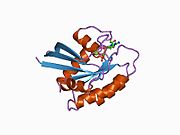
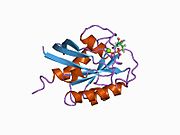

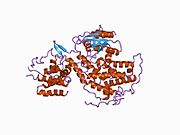
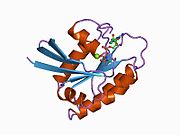

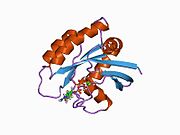
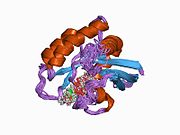





![1iaq: C-H-RAS P21 PROTEIN MUTANT WITH THR 35 REPLACED BY SER (T35S) COMPLEXED WITH GUANOSINE-5'-[B,G-IMIDO] TRIPHOSPHATE](http://upload.wikimedia.org/wikipedia/commons/thumb/4/45/PDB_1iaq_EBI.jpg/180px-PDB_1iaq_EBI.jpg)

![1jah: H-RAS P21 PROTEIN MUTANT G12P, COMPLEXED WITH GUANOSINE-5'-[BETA,GAMMA-METHYLENE] TRIPHOSPHATE AND MAGNESIUM](http://upload.wikimedia.org/wikipedia/commons/thumb/6/62/PDB_1jah_EBI.jpg/180px-PDB_1jah_EBI.jpg)
![1jai: H-RAS P21 PROTEIN MUTANT G12P, COMPLEXED WITH GUANOSINE-5'-[BETA,GAMMA-METHYLENE] TRIPHOSPHATE AND MANGANESE](http://upload.wikimedia.org/wikipedia/commons/thumb/2/2a/PDB_1jai_EBI.jpg/180px-PDB_1jai_EBI.jpg)
